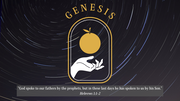|
As a godly man reckoned righteous by God, Abram’s deference to Lot carried a certain level of risk. Indeed, that risk materialized when Lot chose for himself the choice land of the fertile Jordan River valley. We learn from this that Christian kindness is always open to being taken advantage of; that is a risk godly people must be willing to take in obedience to the rule of brotherly love. Lot’s actions and advantage do nothing to thwart God. This reality is both a comfort and foundation. It is comfort in knowing that even with the risk of brotherly kindness, God’s sovereign grace and justice remain unchanged. It is also the foundation of our brotherly love. God’s monergistic work of redemption is what we reflect through our obedience to brotherly kindness.
0 Comments
Abram comes around full circle and returns to the altar he built before the famine in the land. This arduous and circuitous journey was likely a valuable lesson learned on trusting God and seeking His name. That is what Abram should have done in the first place and that is what he does right before Moses introduces Lot. Fulfilling the creation mandates to be fruitful and subdue, Abram and Lot both are blessed by God with great wealth and possessions. Instead of continuing to step on each other’s toes, Abram presents to Lot compromise. This compromise comes Abram’s righteous and godly heart and is a prime example of brotherly love. Brotherly love is an important concept and command for the Christian, so it is appropriate to see where and how it appears in the New Testament. In Abram’s case, he shows deference to his nephew and allows Lot first pick of the land. Lot, seeing Abram’s kindness, chooses for himself and his tribe the choice land of the Jordan River valley. |
About the seriesThe Book of Genesis is the starting point of God’s covenant with His people. This book gives us the historical sketch of the creation, fall, and redemption of the world. Genesis is also a perfect litmus test to gauge whether or not a person fully trusts in the authority, sufficiency, and inerrancy of Scripture. Categories
All
|

